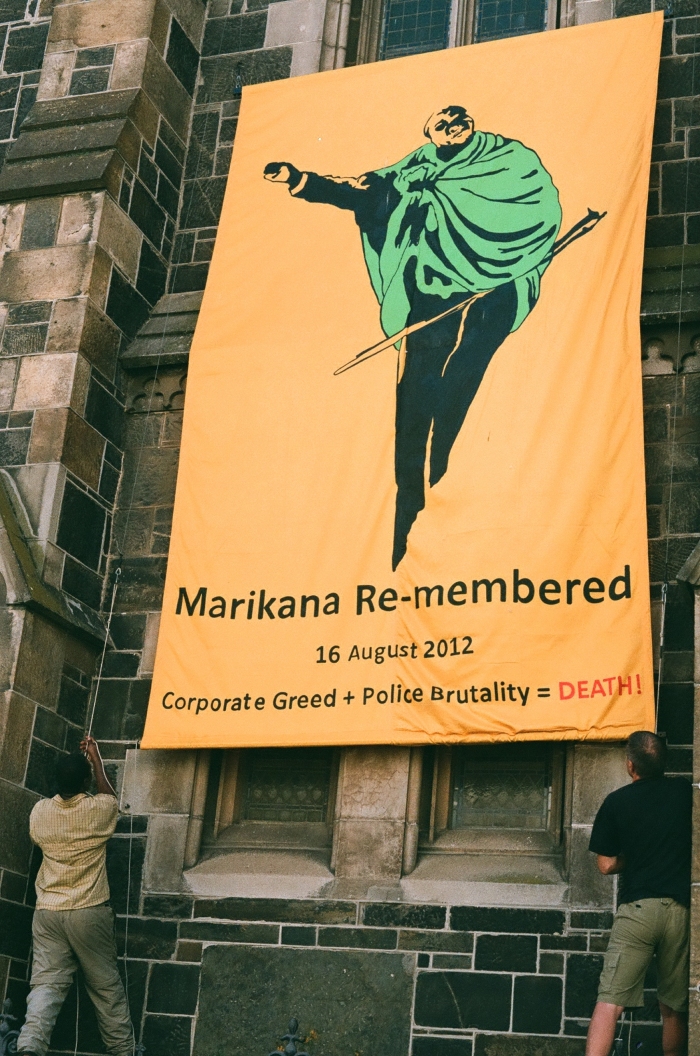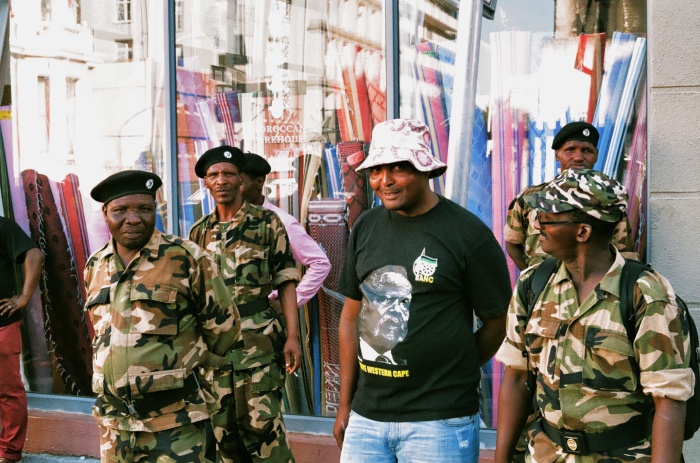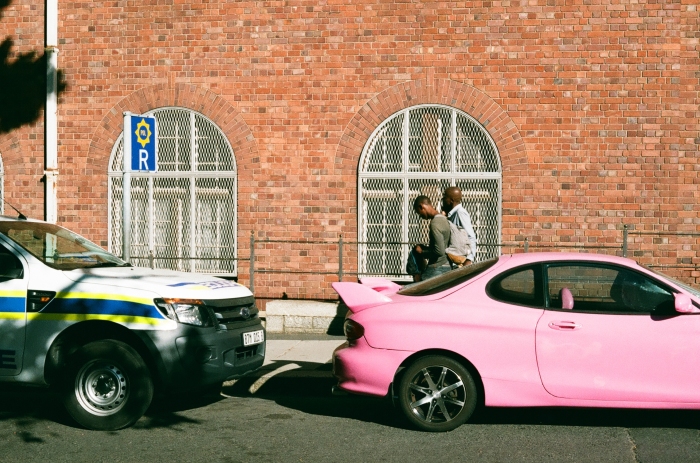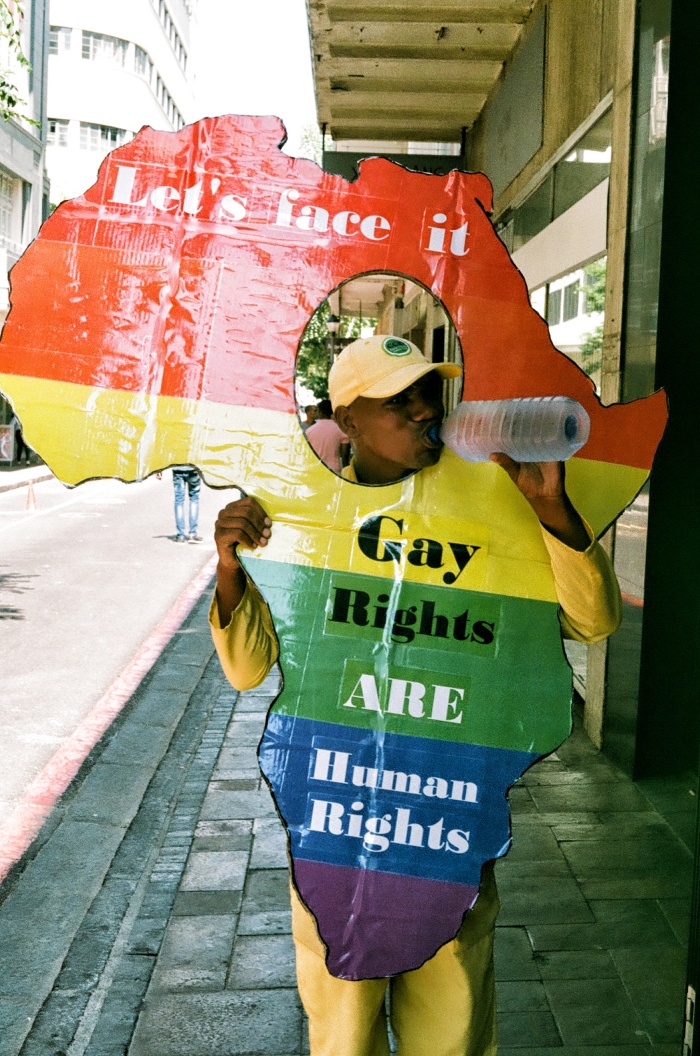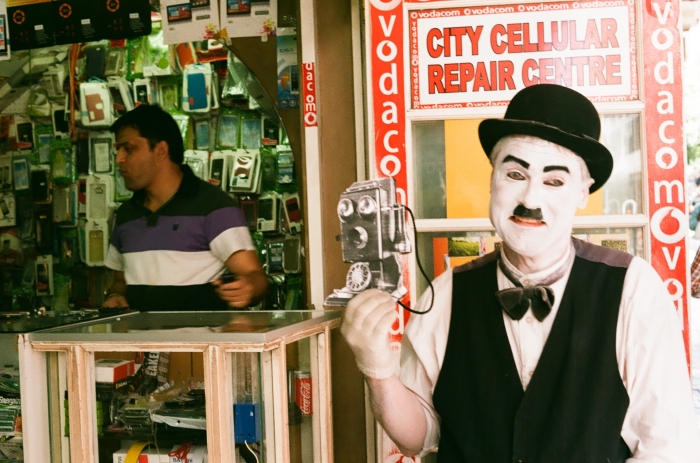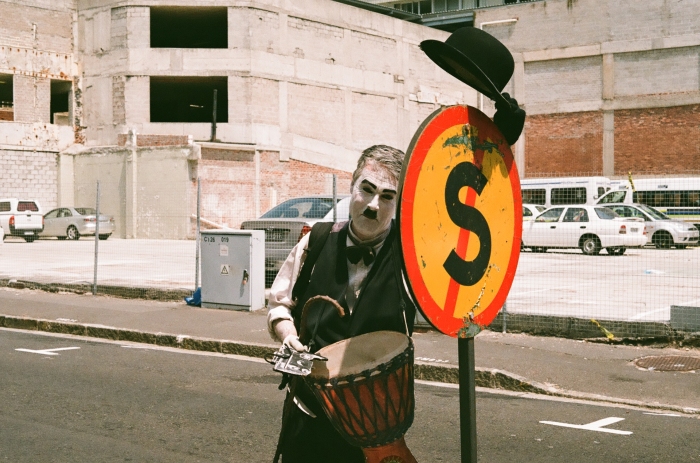
“Hello Neil, so happy to see you!
– ….
– I love your makeup, you really look like Charlie. Do you want a coffee before we leave?
– ….
– Neil, are you not going to talk today at ALL, not even to me?
– (nodding) …”
If Neil takes his activism seriously, he is definitely not a serious activist. I discovered not very long ago that he was not really a mute person. Every time I had seen him, he was wearing his Charlie X outfit, and his only form of communication was to mime. One day, when he was walking down Obs main road, someone threatened him with a knife. Charlie answered by knitting his eyebrows together in a frown and simply staring. The man stood confused and then man ended up leaving. This is one of the many instances where Neil, literally, “disarmed” the situation using humour (something that has served him well in his activist career, where confrontations with the police are inevitable). Besides, he says, “I would not abandon my Charlie character, for anyone.”
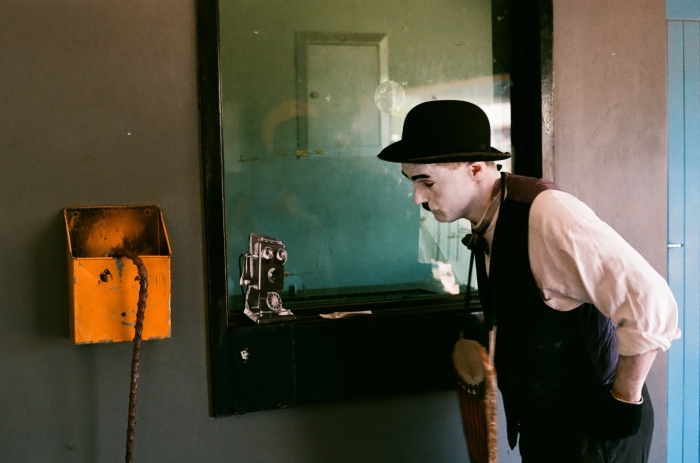
As surprising as it may be, being a mute activist is actually a very smart and efficient way to be heard, especially if like Neil, you have a lot of accessories – colorful and well made placards or giant board games. If you are mute, people can try to oppose you as much as they want, but they won’t get any feeling of victory in their own argument. Words are not the only way we can express our ideas; far from it. As Neil says: “At the moment, there are too many words, not enough action.”
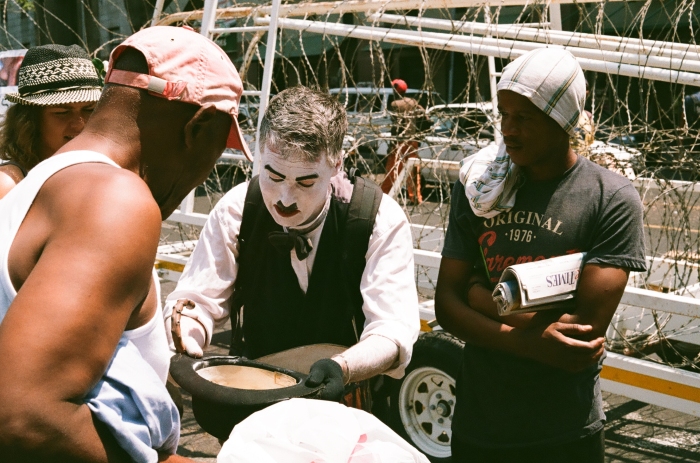
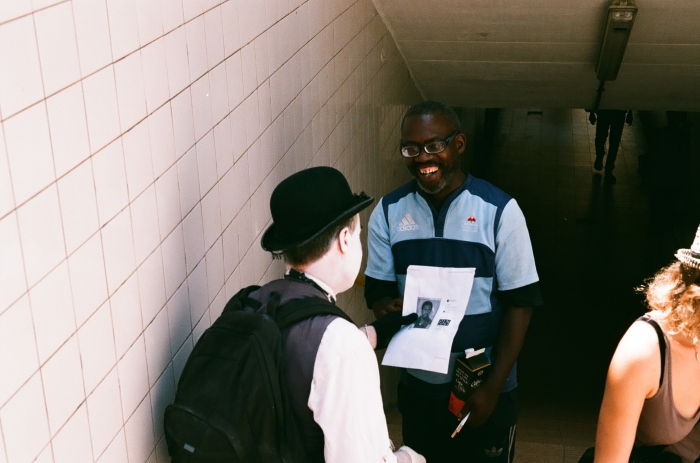
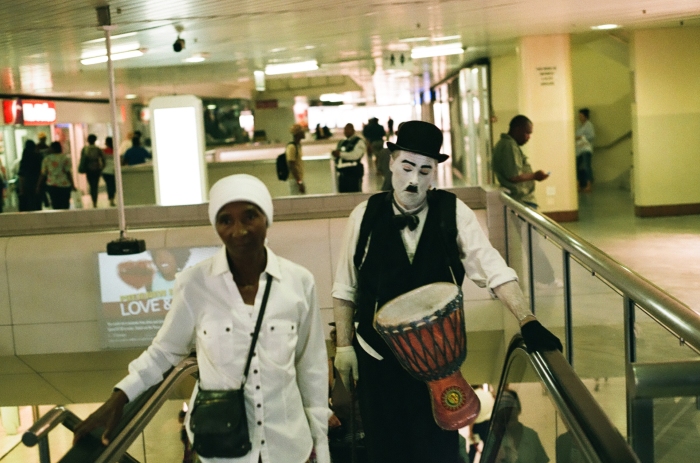 I am fascinated how this 1m70 mute and lame (Neil has a defined limp and walks with a cane) imitation of Charlie Chaplin can be so powerful. When I went to the anti-corruption protest in September 2015, the most memorable thing I reported to my friends was the Charlie Chaplin mime who had set out a giant “Corruption Monopoly” in the middle of the crowd. This monopoly is exactly like the normal board game, except that instead of the old guy with his stick and hat, it is Zuma’s smiley cartoon face. You will go to prison “unless you’re rich.” Instead of acquiring houses, you acquire debt through various operations – Nkandla, Mbombela stadium, Telkom, load shedding – and you “collect debt as you pass Go! Broke!” People are involved physically, play with their own piece and roll a giant dice. Corruption Monopoly is described as “the game where everyone loses. Where the player with the least debt at the end wins a very hollow victory, but learns an awful lot about the state of the nation, about themselves and the corruptibility of others.”
I am fascinated how this 1m70 mute and lame (Neil has a defined limp and walks with a cane) imitation of Charlie Chaplin can be so powerful. When I went to the anti-corruption protest in September 2015, the most memorable thing I reported to my friends was the Charlie Chaplin mime who had set out a giant “Corruption Monopoly” in the middle of the crowd. This monopoly is exactly like the normal board game, except that instead of the old guy with his stick and hat, it is Zuma’s smiley cartoon face. You will go to prison “unless you’re rich.” Instead of acquiring houses, you acquire debt through various operations – Nkandla, Mbombela stadium, Telkom, load shedding – and you “collect debt as you pass Go! Broke!” People are involved physically, play with their own piece and roll a giant dice. Corruption Monopoly is described as “the game where everyone loses. Where the player with the least debt at the end wins a very hollow victory, but learns an awful lot about the state of the nation, about themselves and the corruptibility of others.”
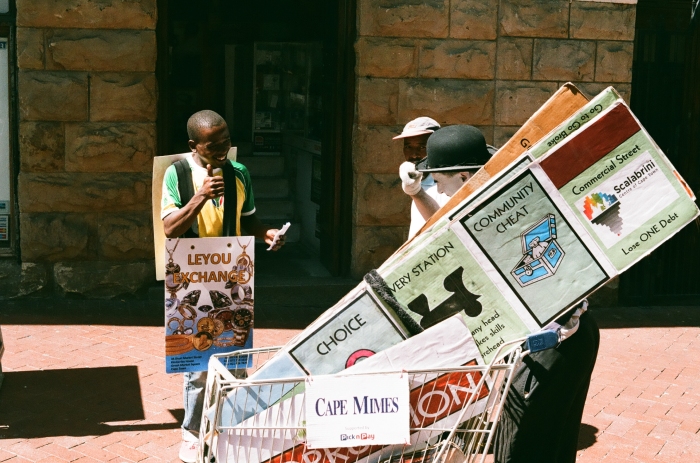 People get to play and have fun, discovering with the large amount of spectators standing around all the fine details of the game, and laughing at the way scandals are presented. Humor is a great weapon to denounce absurd situations in public (supposingly serious) affairs. It gives a simple way of understanding the malfunctioning of a governmental system, too often seen as understandable only to experts where it is mainly a generalized fist in the ass (sorry for the formula). It also gives a sense of belonging to the same people, laughing and engaging as one.
People get to play and have fun, discovering with the large amount of spectators standing around all the fine details of the game, and laughing at the way scandals are presented. Humor is a great weapon to denounce absurd situations in public (supposingly serious) affairs. It gives a simple way of understanding the malfunctioning of a governmental system, too often seen as understandable only to experts where it is mainly a generalized fist in the ass (sorry for the formula). It also gives a sense of belonging to the same people, laughing and engaging as one.

I followed Neil on a very pertinent day in South Africa. It is called “The State of the Nation.” On this day, the president opens the parliamentary session to talk about the achievements of the previous year and the objectives of the upcoming one. The streets on State of the Nation 2016 felt particularly electric. 2015 had been one of the most agitated years of South Africa’s history since the end of the apartheid regime. The latest social media movement, #ZumaMustFall, showed the exhaustion of South Africans in the face of corruption and bad management of the president.
After #Rhodesmustfall, #Feesmustfall, it seems that everything should fall. Is it all crumbling in the kingdom of South Africa?
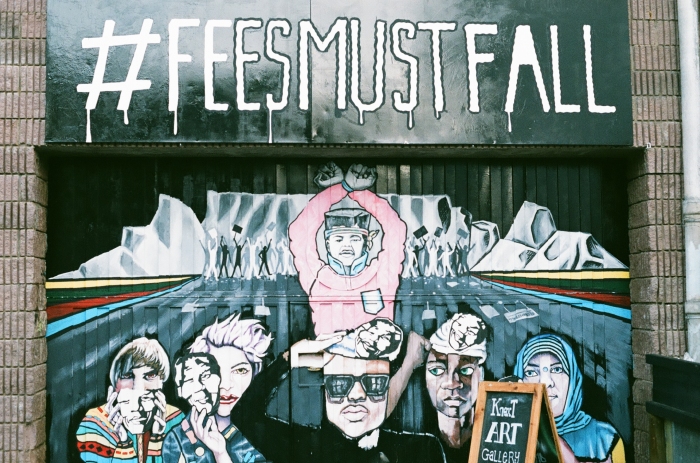 Our day starts at Observatory train station. While waiting on the platform for almost 30 minutes, peoples’ attention to Charlie oscillates between curiosity and discomfort. Charlie is drumming on a cardboard Jambê without making a noise. People don’t know how to react:
Our day starts at Observatory train station. While waiting on the platform for almost 30 minutes, peoples’ attention to Charlie oscillates between curiosity and discomfort. Charlie is drumming on a cardboard Jambê without making a noise. People don’t know how to react:
Is he a tramp or a clown? Is he really mute? Should they applaud a silent music performance? Should they give him a coin? Ignore him? Laugh?
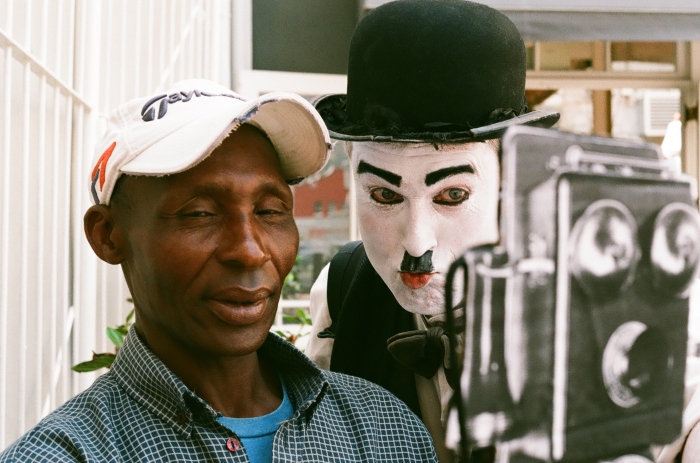 When our train finally arrives, Charlie has had time to take several “selfies” with strangers with his old fashion cardboard phone and to drink a few gulps of his radioactive water.
When our train finally arrives, Charlie has had time to take several “selfies” with strangers with his old fashion cardboard phone and to drink a few gulps of his radioactive water.
The train is full of young black students singing protest songs. Rhythm and energy resonate through the carriage. I feel it, the desire for change, and want to sing too. I wish I knew the words.
 Arriving in town, Charlie is a living spectacle for all. Everyone recognizes him and greets him. A man gives him two rand. To my surprise, most of the people want to engage with him. I didn’t realize how popular Chaplin is, everywhere in the world. He is a beloved character to everyone, and that is a point marked by Neil. As the day goes on, I am more and more charmed by the character he has chosen to be an activist. It is so smart!
Arriving in town, Charlie is a living spectacle for all. Everyone recognizes him and greets him. A man gives him two rand. To my surprise, most of the people want to engage with him. I didn’t realize how popular Chaplin is, everywhere in the world. He is a beloved character to everyone, and that is a point marked by Neil. As the day goes on, I am more and more charmed by the character he has chosen to be an activist. It is so smart!
1. Everyone recognizes him;
2. From the moment they see him, people have a positive feeling towards him;
3. People engage with him quite directly: the contact is done almost instantaneously;
4. People can’t seriously argue with him, and if they do, it is useless, because he is mute;
5. Charlie Chaplin’s life and commitment is inspiring and fully in line with Neil’s ideals.
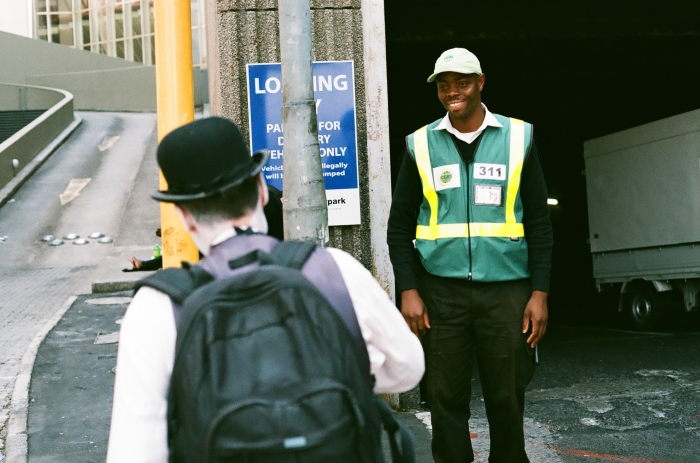 As we move to Scalabrini center to get his magic trolley, we enter the core of social agitation. Tension in the air. Policemen want to prevent us from walking passed them but Charlie’s charm makes them laugh; he salutes them and they let us go.
As we move to Scalabrini center to get his magic trolley, we enter the core of social agitation. Tension in the air. Policemen want to prevent us from walking passed them but Charlie’s charm makes them laugh; he salutes them and they let us go.  Scalabrini is a human rights center, maybe the most active and helpful for refugees arriving in Cape Town. They have services assisting people in advocacy, employment and learning english, women and youth empowerment. Scalabrini’s aim is to promote human rights and understanding, with the integration of refugees and the development of the province as a result of their migration.
Scalabrini is a human rights center, maybe the most active and helpful for refugees arriving in Cape Town. They have services assisting people in advocacy, employment and learning english, women and youth empowerment. Scalabrini’s aim is to promote human rights and understanding, with the integration of refugees and the development of the province as a result of their migration. 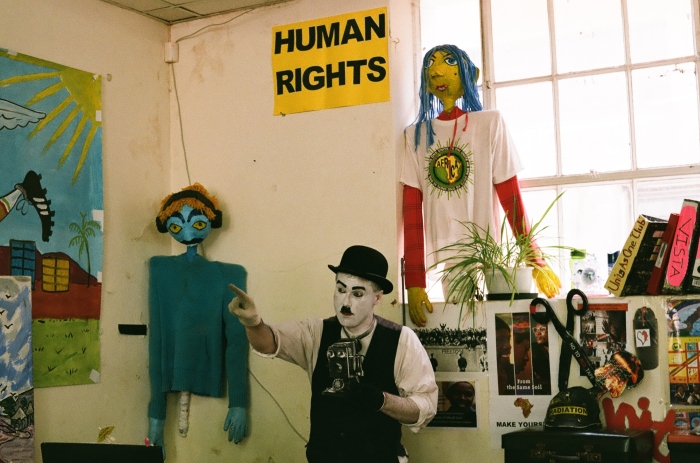 It has almost been 4 hours that I am with Charlie and he hasn’t voiced a word. With the trolley full of various maps, cards, and the monopoly, we head over to Green Market Square where we will layout the board game. For more than an hour, people of all ages play their own game of corruption in front of an amused and boisterous crowd.
It has almost been 4 hours that I am with Charlie and he hasn’t voiced a word. With the trolley full of various maps, cards, and the monopoly, we head over to Green Market Square where we will layout the board game. For more than an hour, people of all ages play their own game of corruption in front of an amused and boisterous crowd.
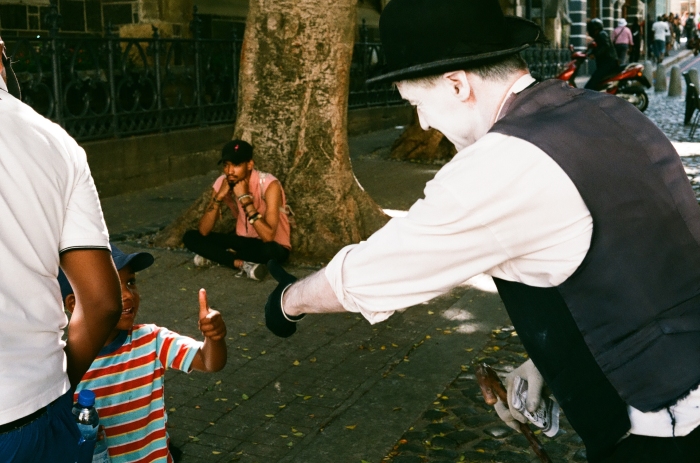
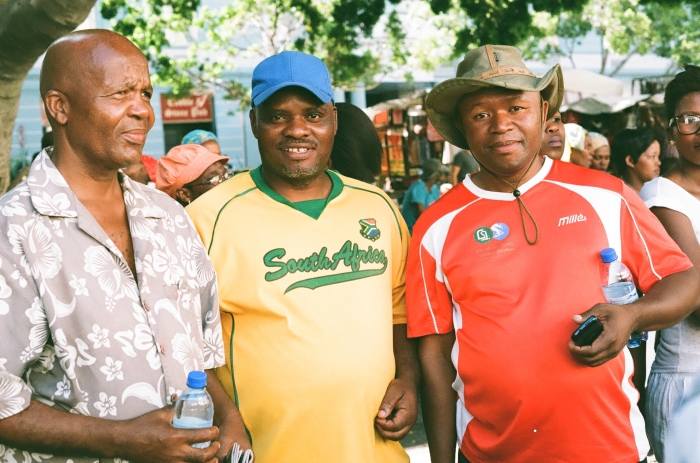
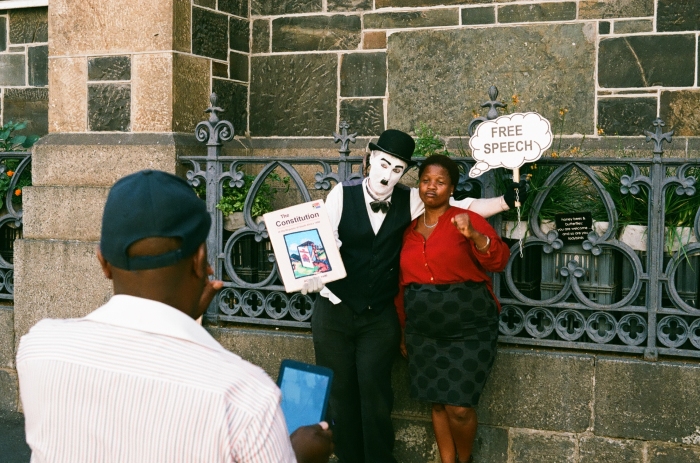 As we finally pack up the game, the streets are really buzzing. People are gathering according to their political party. We stay with the EFF on Adderley Street.
As we finally pack up the game, the streets are really buzzing. People are gathering according to their political party. We stay with the EFF on Adderley Street.
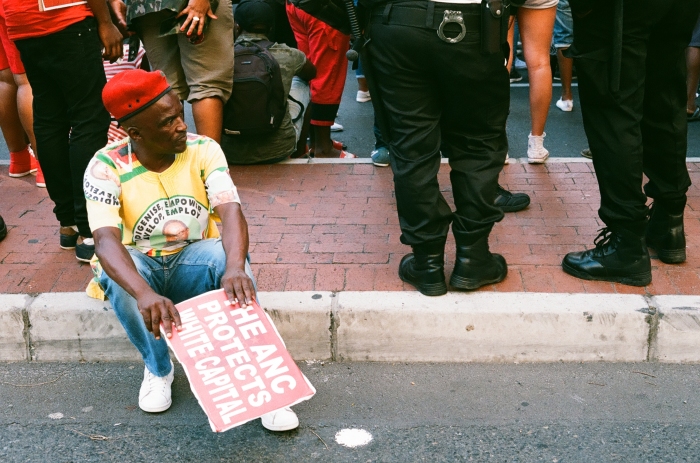
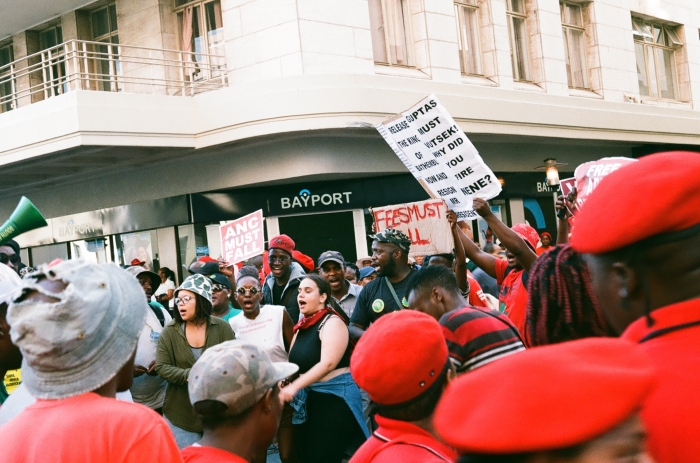 It is such a contrast, observing the chaotic, loud crowd and Charlie’s calm, slowly pushing his trolley through the throngs. He is displaying the giant LGBTI rainbow map of Africa saying: “Let’s face it: gay rights are human rights”. Eventually, a man comes and reacts angrily to it, claiming homosexuality is “unAfrican” and “uncultured”. Charlie turns over the map to show a refutation of this: examples of homosexuality existing in various African tribes before colonization. The man continues his speech but is disconcerted in front of Charlie’s muteness. Charlie is always right.
It is such a contrast, observing the chaotic, loud crowd and Charlie’s calm, slowly pushing his trolley through the throngs. He is displaying the giant LGBTI rainbow map of Africa saying: “Let’s face it: gay rights are human rights”. Eventually, a man comes and reacts angrily to it, claiming homosexuality is “unAfrican” and “uncultured”. Charlie turns over the map to show a refutation of this: examples of homosexuality existing in various African tribes before colonization. The man continues his speech but is disconcerted in front of Charlie’s muteness. Charlie is always right.
At the end of the day, Zuma didn’t renounce his function as president and we are exhausted.
Activism is a powerful game that takes a lot and gives a lot.
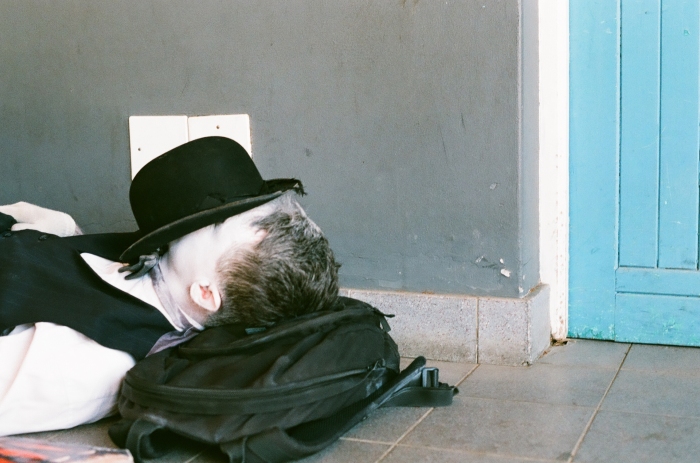 Back to Scalabrini center, Charlie takes off his make up, very slowly… and finally, opens his mouth. He is Neil again, the normal guy with a now hoarse voice.
Back to Scalabrini center, Charlie takes off his make up, very slowly… and finally, opens his mouth. He is Neil again, the normal guy with a now hoarse voice.
Neil’s activism career started long ago in London. He took part in the “Reclaim the streets” movement: the “Occupy” of the 1990s, a fight to get the streets back from the cars, seen as the tangible symbols of the empire of capital on our human lives. Festive (and massive) gatherings were organized in the middle of London, to reconquer places where humanity seemed to have been banned.
His relationship with his best double, Charlie X, started as a smart way to avoid the law. Inspired by the courageous action of Brian Haw, who camped in Parliament Square in London for 10 years in reaction to the Iraqi war, many people took to the streets in protest. Along with bears, Cinderellas and other crazy outfits, Neil joined a creative way for protestors of “bypassing” the law. Back then, Neil also had a cultural squat called “Vertigo”.
Since he moved in South Africa in 2006 (to settle with his South African wife), Neil wants to implement a creative protest culture in South Africa. There are “so many things you can do to raise awareness ” he says. The possibilities are infinite and just ask a little bit of imagination. As a former ANC supporter from the international community, Neil has been disappointed by the behavior of those supposed to govern. He sees corruption and the waffle of politicians who play with words without acknowledging that they play with fire.
In this anarchist society, full of historical, social and racial scares, it is always dangerous to blow on embers.
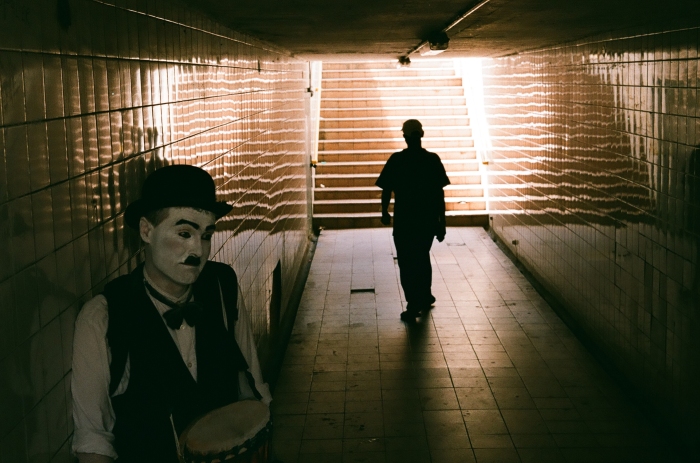 My conclusion comes quite abruptly :
My conclusion comes quite abruptly :
As much as I think it would be fair for some people in this world to be covered with mud or cow shit for what they do to the planet and to society, I think Neil should be covered with flowers, for giving his life to a greater cause, facing the risk of being arrested and the exhaustion of social gatherings, while we simply live our lives eating our triangle sandwiches.
It has now been 10 years of repeating the same routine, painting his face in white and putting his black waistcoat.
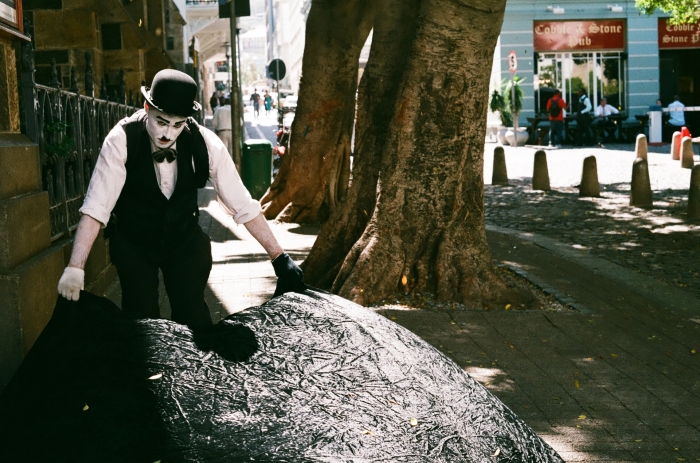 In this system, there is no justice if you respect the rules of a corrupted society.
In this system, there is no justice if you respect the rules of a corrupted society.
For Neil and for some others to whom we owe a lot, civil disobedience is the answer to exist and to shape a world that resists the big lobotomy of rotten democracy.
You want to play to Charlie’s amazing Corruption Monopoly, the game everyone loses ? you can dowload it here : http://scalabrini.org.za/category/materials/#listing


